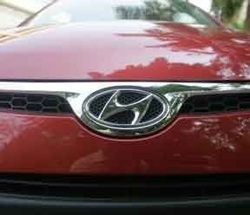|
Seoul: Hyundai Motor Group is set to challenge the dominance of Maruti Suzuki in the small compact car market where Alto has been the highest-selling four wheeler for a long, long time.
The company will take the wraps off ‘Eon’, it’s smallest car in India yet, in October. Eon is known by as ‘Ha’ in other markets. Read: Hyundai's 800cc car enters final test run phase “We are launching Ha next month, which is Hyundai’s first car exclusively for the Indian market,” William Y W Lee, executive vice-president, overseas sales division of Hyundai Motor Company told DNA. Inside Hyundai, more particularly within the walled confines of its Namyang Research and Development Centre at Gyeonggi province, and also at its Indian development facility at Hyderabad, the vehicle is being put to final tests to prepare it for its upcoming launch. A media preview in India is slated for September 16-17, Hyundai officials in Korea said leading up to its launch in October. Read: Honda Brio is spacious, powerful and brilliant for city use Designers associated with Eon described it as a “breakthrough product meeting unmet need of style, comfort, utility, space and economy” for a small compact car. While pricing is yet to be fixed, officials of Hyundai told DNA that Eon might be a little pricier than Alto, whose base version sells at around Rs 2.5 lakh ex-showroom. What was the immediate inspiration for Hyundai to develop a vehicle just for the Indian market? The answer could well be in Steve S Yang’s background. Yang, who is president & chief executive officer of Hyundai Motor Company, overlooked Hyundai Motors India’s operations in 2005. “Being the managing director of HMIL six years ago I always pay special attention to our Indian market. Our engineers in India and Korea did their best to meet Indian customers’ need taste and requirement,” Yang said. Car review: How good is the latest Tata Vista? Arvind Saxena, Hyundai’s sales director for India, cited the second reason: “Alto has been dominating the small compact car segment for far to long without a rival; we would pose a serious challenge.” Yang is so excited about the contribution of the 600-strong R&D team in Hyderabad that he is now thinking of sending some of them to the Namyang centre to develop cars for the European market as well. Even as Hyundai is turning to India, keeping the domestic automobile market thriving at a time when sales are down due to high interest rates, it continues its focus on Europe,where it launched i40, the first D-segment car developed for that market, in February, ahead of its Korean debut which happened last week. The i40 reflects the spirit of change at Hyundai, and represents the company’s new concept of ‘modern premium’: the philosophy that premium quality and characteristics should be accessible more, Yang said.Read: Hyundai boss gives $ 462 million to charity Both Eon as well as i40 reflects Hyundai’s another emerging market strategy: developing vehicles specific to regions. This explains why i40, and even i30 are not made available to the Indian market, where i10 and i20 clock respectable sales volume. Not that Yang doesn’t want Indians to enjoy driving i40. Hyundai would have brought that family estate car to India but for its high import duties. “I really want to introduce in India the new models which we have launched in Korea but duties are so high,” Yang said. A fully built car imported to India attracts customs duty of 60% while for assembled engines, transmissions and gearboxes the duty is 30%. Making separate vehicles for specific markets doesn’t however mean separate model platforms as Hyundai need to use components across models to keep their costs under check. Hyundai’s focus on the European and the American market is also to do with its relative lack of customers’ awareness, a challenge which the Korean automaker plans to take head on beginning with making people pronounce its name. |
Ankit
|





 RSS Feed
RSS Feed
